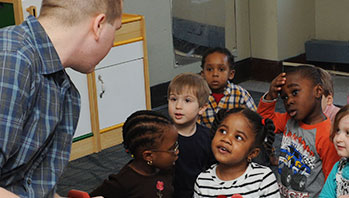- rubber band guitars
- What Is a Scientist? (book)
- pluck
- sound
MA Standards:
Speaking and Listening: SL.PK.MA.1 Participate in collaborative conversations with diverse partners during daily routines and play.
Language: L.PK.MA.1 Demonstrate use of oral language in informal everyday activities.
Language: L.PK.MA.6 Use words and phrases acquired through conversations, listening to books read aloud, activities, and play.
Head Start Outcomes:
Language Development/Receptive Language Attends to language during conversations, songs, stories, or other learning experiences.
Language Development/Expressive Language Uses language to express ideas and needs.
PreK Learning Guidelines:
English Language Arts/Language 2 Participate actively in discussions, listen to the ideas of others, and ask and answer relevant questions.
Talk Together: Sound Explorers

© Commonwealth of Massachusetts, Department of Early Education and Care (Jennifer Waddell photographer). All rights reserved.
STEM Key Concepts: Sounds vary in three ways: volume (loud or soft), pitch (high or low), and timbre (quality)
ELA Focus Skills: Listening and Speaking, Vocabulary
Gather children in a circle around the rubber band guitars. Review with children what they’ve been learning about sound through their explorations with the rubber band guitars, and talk about any questions they have about making sounds with the guitars. Ask, Do you have any questions about why rubber bands make sounds when they are plucked? (the vibration creates sound waves) Do you wonder how you can make other kinds of sounds with the rubber bands? To spark new questions, encourage children to show what they learned so far with the guitars.
After discussing children’s questions, hold up the book What Is a Scientist? by Barbara Lehn. Turn to pages that engage children and help children make connections between their own explorations and those of the children in the book. Ask, How are you exploring like these children? How are you exploring like a scientist?
